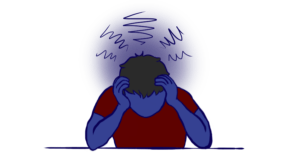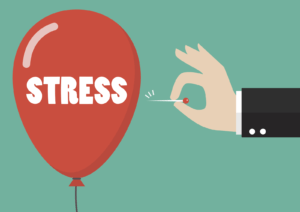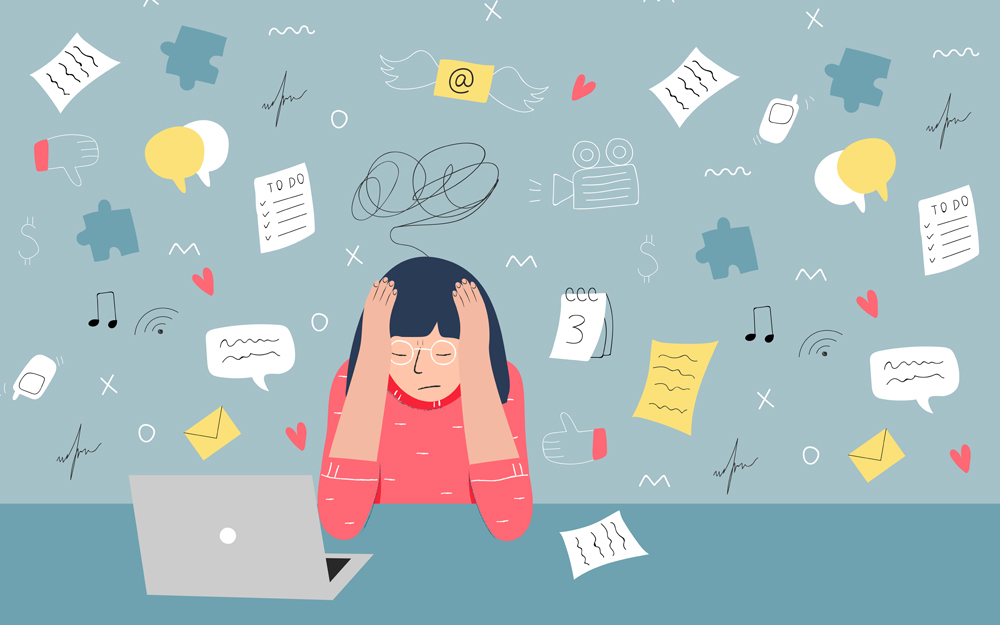We all know that stress isn’t good for us, but do you know exactly how it affects your body? Stress can cause a wide variety of physical symptoms, many of which are not very pleasant. In this blog post, we will discuss 16 physical symptoms of stress. If you are feeling stressed out, it is important to be aware of these symptoms and take steps to address the root causes of your stress.
Contents
- 1 Defining Stress
- 2 Physical Symptoms of Stress
- 2.1 Fatigue
- 2.2 Headaches
- 2.3 Upset stomach
- 2.4 Bodyaches and pains
- 2.5 Chest pain
- 2.6 Shortness of breath
- 2.7 Sweating
- 2.8 Accelerated heartbeat
- 2.9 Fluctuations in libido
- 2.10 Skin problems
- 2.11 Hair loss
- 2.12 Weight gain or weight loss
- 2.13 Sleep problems
- 2.14 Frequent colds or infections
- 2.15 Stomach problems
- 2.16 Panic Attacks
- 3 Other Signs Of Stress
- 4 Tips To Cope
- 5 Conclusion
Defining Stress
Stress is the body’s response to any demand placed upon it. When you perceive a threat, your body releases hormones that prepare you to fight or flee. This “fight-or-flight” response is a survival mechanism that has served us well in our evolution. But in today’s world, we are often bombarded with demands and threats that are not life-threatening, yet still trigger this stress response.
While some level of stress is normal and even beneficial, chronic stress can have a negative impact on your health. When you are constantly in “fight-or-flight” mode, your body never gets a chance to relax and repair itself. This can lead to a variety of physical symptoms, as well as mental and emotional problems.
It is important to note that stress is not the same for everyone. What causes stress for one person may not have the same effect on another. And how you perceive and deal with stress also plays a role in how it affects your health.
Physical Symptoms of Stress

Stress symptoms manifest themselves in various ways. Some people may experience mostly physical symptoms, while others may have more emotional or behavioral signs. It also finds its forms in our physical, behavioral, emotional, and cognitive ways. Let’s take a look at some of the 16 most common physical symptoms of stress:
Fatigue
Feeling tired all the time is a common symptom of stress. When you are under chronic stress, your body’s adrenal glands produce excess cortisol, which can lead to fatigue. This can eventually lead to adrenal fatigue, a condition where the adrenal glands are unable to produce enough hormones.
Headaches
Stress can cause tension headaches or migraines in some people. This is likely due to the increased muscle tension that occurs when you are stressed out. It is also a result of the increased production of cortisol, as well as the pent-up and unreleased frustrations.
Upset stomach
Stress can cause a variety of gastrointestinal problems, including indigestion, heartburn, diarrhea and constipation. The reason for this is that stress can trigger an increase in stomach acids, as well as slow down digestion. This makes it difficult to eat and retain food.
Bodyaches and pains
Chronic stress can lead to muscle pain and stiffness, as well as joint pain. This is likely due to the increased muscle tension that occurs when you are stressed out. The most common points in the body for these aches are the neck, shoulders and lower back.
Chest pain
Stress can cause chest pain, which may be a sign of an underlying heart condition. If you experience chest pain, it is important to see a doctor to rule out any serious medical conditions. The reason for this is that stress can cause an increase in blood pressure and heart rate, which puts strain on the heart.
Shortness of breath
Stress can cause shortness of breath, which may be a sign of an underlying heart condition. If you experience shortness of breath, it is important to see a doctor to rule out any serious medical conditions.
Sweating
Sweating is often a physical response to stress or anxiety. When you are under stress, your body’s sympathetic nervous system kicks into gear, causing you to sweat more than usual. It can also happen due to the rising temperatures in the body that occur when you are stressed out.
Accelerated heartbeat
An accelerated heartbeat is another physical response to stress. When you are under stress, your body releases hormones that cause your heart to beat faster. It can also be a consequence of the increased blood pressure that occurs when you are stressed out.
Fluctuations in libido
Stress can cause fluctuations in libido, as well as erectile dysfunction in men. This is likely due to the increased levels of cortisol in the body when you are stressed out.
Skin problems
Stress can cause a variety of skin problems, including acne, eczema and psoriasis. This is likely due to the increased production of cortisol, which can lead to inflammation. It can also be a result of the increased stress levels, which can lead to poorer self-care.
Hair loss
Stress can cause hair loss, which may be temporary or permanent. This is likely due to the fact that stress can trigger an increase in the hormone DHT, which leads to hair loss. It can also be a result of the poor self-care that often accompanies high stress levels.
Weight gain or weight loss
Stress can lead to weight gain or weight loss depending on how you cope with it. Some people overeat when they are stressed out, while others lose their appetite altogether. Stress can further lead to poor eating habits and emotional eating, which causes weight gain. On the contrary, some people may lose weight due to the fact that stress can lead to poor appetite and loss of interest in food.
Sleep problems
Stress can cause sleep problems, such as insomnia or restless sleep. This is likely due to the fact that stress can affect the hormone levels in your body, which can disrupt your sleep cycle.
Frequent colds or infections
Stress can weaken your immune system, making you more susceptible to colds and infections. This is because stress can cause an increase in the hormone cortisol, which can suppress the immune system.
Stomach problems
Stress can cause a variety of gastrointestinal problems, including indigestion, heartburn, diarrhea, acidity, and constipation. The reason for this is that stress can trigger an increase in stomach acids, as well as slow down digestion.
Panic Attacks
Stress can cause panic attacks, which are sudden episodes of intense fear or anxiety. This is likely due to the fact that stress can trigger an increase in the hormone adrenaline, which can lead to a panic attack. It can further be a result of the changes in brain chemistry that occur when you are under stress.
All of these physical symptoms of stress can have a serious impact on your health if not managed properly. It is important to find healthy ways to cope with stress so that you can avoid these negative consequences. If you are experiencing any of these physical symptoms of stress, it is important to see a doctor to rule out any underlying medical conditions.
Other Signs Of Stress

Now that we have discussed the physical symptoms of stress, we should also take a look at some of the other signs that may indicate that you are under stress. These include:
- Emotional symptoms: feeling overwhelmed, anxious, irritable or moody, feeling hopeless or pessimistic, feeling disconnected from others, feeling like you can’t cope, mood swings
- Behavioural symptoms: overeating or undereating, overworking or procrastinating, using alcohol, cigarettes or drugs to cope, withdrawing from friends and activities, sleeping too much or too little
- Cognitive symptoms: constant worrying, racing thoughts, difficulty concentrating, forgetfulness, negative thinking, indecisiveness
If you are experiencing any of these symptoms, it is important to take steps to reduce your stress levels. There are many ways to do this, such as exercise, relaxation techniques, and counselling. If you are struggling to cope with stress on your own, it is important to seek help from a professional.
Tips To Cope

When it comes to managing stress, it is important to find what works for you. There is no one-size-fits-all approach to stress management. Some people find that exercise helps them to cope with stress, while others find that relaxation techniques are more effective. It is important to experiment and find what works for you. Here are some tips to get you started.
- Exercise: Exercise is a great way to reduce stress. It releases endorphins, which have mood-boosting effects. It can also help to improve sleep and increase energy levels.
- Relaxation techniques: Relaxation techniques such as yoga, meditation, and deep breathing can help to reduce stress. These techniques can help to calm the mind and body.
- Sleep hygiene: Sleep hygiene is the term used to describe behaviors that can promote good sleep. This includes things like setting a regular sleep schedule, avoiding caffeine before bed, and creating a calm environment in your bedroom.
- Engaging in self-care: Self-care is important for managing stress. This includes things like getting regular exercise, eating a healthy diet, and getting enough sleep. It also includes things like taking time for yourself, doing things you enjoy, and spending time with friends and family.
- Balanced nutrition: Eating a balanced diet can help to reduce stress. This means eating plenty of fruits, vegetables, and whole grains, and avoiding processed foods.
- Counselling: Counselling can be an effective way to manage stress. A counselor can help you to identify and change the thought patterns that are contributing to your stress.
- Support groups: Support groups can provide a space for you to share your experiences with others who are going through similar things. This can be a great way to reduce stress and feel connected.
Stress is a normal part of life, but it can have a serious impact on your health if not managed properly. It is important to find healthy ways to cope with stress so that you can avoid these negative consequences.
There are many different ways that you can cope with stress. If you are struggling to cope with stress on your own, it is important to seek help from a professional. There are many resources available to help you deal with stress, so don’t hesitate to reach out for help if you need it.
Conclusion
In conclusion, stress is a normal part of life, but it can have a serious impact on your health if not managed properly. There are many different ways to cope with stress, so find what works for you. If you are struggling to cope with stress on your own, don’t hesitate to seek help from a professional. There are many resources available to help you deal with stress, so don’t hesitate to reach out for help if you need it.
For more information, please contact MantraCare. Stress can have both physical and mental effects on the body, leading to negative consequences such as anxiety, depression, and even physical illnesses. If you have any queries regarding Online Stress Counseling experienced therapists at MantraCare can help: Book a trial Stress therapy session


